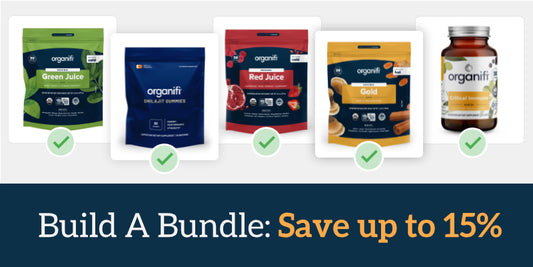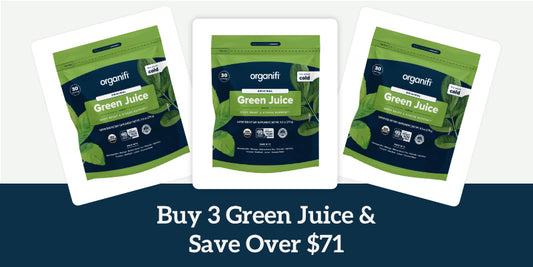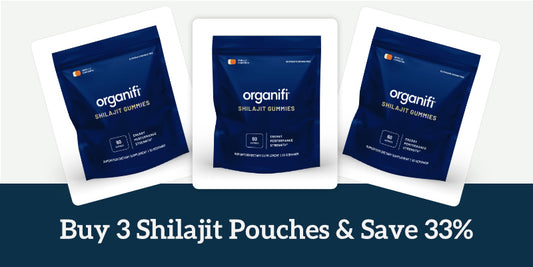Written by: Kat Gal
Optimal health starts in your gut. This means that all disease starts in your gut too.
Did you know that there are more bacteria in your digestive system than there are cells in your body? It’s true. Your gut bacteria combined weighs about 4 lbs.
Since all these bacteria control your health, the kind of bacteria you host matters. If your body hosts an overwhelming amount of bad bacteria, you will experience imbalance, sluggishness, pain and disease. If the good bugs are on the winning side and there is a healthy balance between good and bad bacteria, your body can create balance and experience health.
Eating a poor diet and being exposed to an environment full of heavy metals, pesticides and chemicals leads to imbalance in your gut flora. It can lead to leaky gut, otherwise known as intestinal permeability that causes undigested food particles, toxic waste products and bacteria to "leak" through your intestines and flood your bloodstream.
That doesn’t sound good, does it?
How To Tell If You Have Leaky Gut

If you're experiencing any of these major signs/symptoms of poor gut health, there's a good chance the condition of your gut could be behind how you're feeling.
Dysbiosis:
Dysbiosis refers to an imbalance of microbial colonies in your body.
Signs of dysbiosis:
- Acne
- Food allergies
- Food sensitivity
- Irritable Bowel Syndrome (IBS)
- Leaky Gut Syndrome
- Chronic fatigue/fibromyalgia
- Mental fogginess
- Learning and behavioral disorders
- Depression
- Lactose Intolerance
- Skin issues, like Eczema, Psoriasis, Rashes
- Autoimmune Diseases (lupus, MS, arthritis, etc.)
Limiting your starch, sugar and processed food intake, eating plenty of whole foods and taking probiotics can help this issue.
Antibiotic Use
Antibiotics not only kill the bad bugs, but the good guys too. If you are taking antibiotics, it is important to take probiotics during and after your treatment to keep your gut flora healthy and balanced. (4)
Allergies
Allergies are often linked to poor gut health and are a side effect of modern civilization. Healing your gut flora can help your body to handle natural foods and environmental allergens better. (2)
Mental Health
Your gut is your second brain. Since your gut health affects your body’s ability to create dopamine and serotonin (the happy hormones), it is responsible for your happiness and mental health. A healthy diet and probiotics can boost your mental health and happiness levels. (3)
Toxic Overload
Food toxins, environmental toxins and even vaccination damage can lead to poor gut health and health issues.
Signs of toxin overload:
- Hormone imbalance (especially with bisphenol A, which mimics estrogen in the body and disrupts the endocrine system – home to your thyroid, adrenal glands and hormones)
- Unexplained nausea
- Digestive issues
- Stomach or abdominal pain
- Nervous system dysfunction
- Asthma
- Headaches
- Foggy thinking
- Mood disorders
- … and unfortunately, that’s only the tip of the iceberg!
Doing your best to avoid toxins, eat a clean diet and take probiotics are key to your recovery.
Creating balance in your gut and health in your body is possible and simple.
For one, ditch processed foods, processed sugar, artificial ingredients, added junk and chemicals. Eat a mostly organic, whole foods diet with lot of greens, vegetables, fruits, nuts, seeds, legumes, beans and whole grains. When it comes to personal hygiene and household items, stick to natural and organic whenever possible. Drink plenty of water, exercise, sleep plenty and work on a positive mindset.
These basic steps are key to your gut health. But there is one crucial step you CANNOT forget about no matter what...
PROBIOTICS.
Why Probiotics?
Probiotics are microorganisms that can actually improve your health. They are good bacteria that can help create balance in your system and therefore, prevent, improve and remedy all sorts of ailments. (1)
Taking Probiotic Supplements
Choose high-quality probiotic supplements with at least 50 billion CFUs and 10+ strains of bacteria (hint: the best probiotic I could personally find on the market is our very own Biotic Balance. It seriously changed my gut health for the better. The best part: it doesn’t even require refrigeration).
Along with your daily probiotic capsule, you should also eat plenty of probiotic-rich foods to boost your body’s chances to create health quickly.
The Best Sources Of Probiotics
- Yogurt: Yogurt is probably the most popular and well known fermented food in the American diet. We highly recommend non-dairy varieties for the best benefits. Coconut and almond yogurt are great options.
- Kefir: Kefir is said to be one of the most probiotic rich foods on the planet. It is often used to help conditions like leaky gut, inflammatory bowel disease, lactose intolerance and candida.
- Sauerkraut: Sauerkraut is rich in probiotics and is an excellent way to rebuild healthy gut bacteria levels.
- Kimchi: Kimchi comes from Korea and is like a supercharged form of sauerkraut. It usually contains cabbage, red peppers, onions, scallions, garlic and salt.
- Umeboshi: Umeboshi is basically a pickled plum. It has been a staple in Japanese, Chinese and Korean diets for centuries.
- Kombucha: Kombucha is a sweet tea that has been fermented using good bacteria and yeast and is a powerful probiotic.
- Water Kefir: You can make water kefir with organic sugar water, coconut water, or fresh juice, Water Kefir grains or a Kefir Starter Culture.
- Fermented Kod Liver Oil: This oil, unlike regular fish oil supplements, is cold processed through fermentation instead of heat processed.
- Miso: Miso is a traditional Japanese paste made from soybeans, sea salt and koji.
- Natto: This is a low calorie, high protein fermented superfood that has been considered one of the “health secrets” of the Japanese people for centuries.
Other Important Supplements For Healing Your Gut
- L-Glutamine: Glutamine is an essential amino acid, which is anti-inflammatory and necessary for the growth and repair of your intestinal lining. (5)
- MCT Oil: The MCFAs in coconuts are easier to digest than other fats, making them a better choice for those with gut issues. MCT oil is also super easy to digest for the body. (6)
- Aloe Vera: This herb is a rock star among herbs! It contains over 200 active compounds that can help you lose weight, heal your skin, detox, de-stress, alkalize your body and stock up on amino acids, vitamins and minerals. (7)
- Bone Broth: Nutrient-rich bone contains collagen and the amino acids proline and glycine, which may help heal your damaged cell walls. (8)
- Omega-3s: Omega 3-s help reduce inflammation, which aids in the healing process. (9)
-
Green Juice: Liquid nutrients are easier for the body to absorb and enter the bloodstream quickly. There are so many stories of people who have changed their lives through juicing! It is a fast-track way to fill your hard-working body with the tools it needs to heal and cleanse itself. (10)
Don’t have a juicer or are too busy to juice? Try our Organifi Green Juice powder. Just mix it with water to have a delicious superdrink in seconds.
Following these tips, you can create health and balance in your gut in no time.
How will you take care of your gut today? Share away in the comments below. We would love to hear from you.
And remember, we're in this together.
Kat Gál is a multi-passionate writer, world traveler, nomad, runner, and cat-person. She is a lifelong learner who lives outside of her comfort zones stretching her boundaries and discovering beauty around the world. She is a Certified Holistic Health and Life Coach who encourages others to embrace their unique authentic selves, follow their heart and find their own version of freedom in life.
References:
- http://www.greenmedinfo.com/substance/probiotics#
- https://www.sciencedaily.com/releases/2010/06/100614171907.htm
- https://gutpathogens.biomedcentral.com/articles/10.1186/1757-4749-5-3
- http://journals.sagepub.com/doi/abs/10.1177/0884533608329297
- https://academic.oup.com/jn/article/131/9/2515S/4687557
- https://www.researchgate.net/profile/Joris_Michiels/publication/8167581_Effect_of_medium_chain_fatty_acids_and_benzoic_acid_as_alternative_for_antibiotics_on_growth_and_some_gut_parameters_in_piglets/links/589886ec4585158bf6f6ba00/Effect-of-medium-chain-fatty-acids-and-benzoic-acid-as-alternative-for-antibiotics-on-growth-and-some-gut-parameters-in-piglets.pdf
- https://www.tandfonline.com/doi/abs/10.4081/ijas.2011.e36
- https://www.consultantnutritionist.com/General-Health-Nutrition/Traditional-Bone-Broth-in-Modern-Health-and-Disease.html
- http://www.ingentaconnect.com/content/ben/mrmc/2004/00000004/00000008/art00007
- https://www.koreamed.org/SearchBasic.php?RID=0124KJN/2003.36.9.933&DT=1




